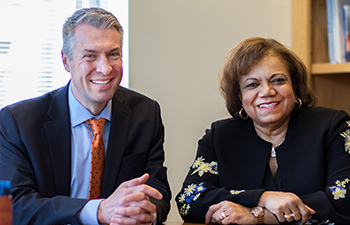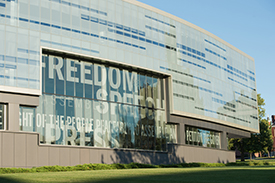Shared Goals
August 8, 2018
Shared Goals and Higher Callings
The deans of Syracuse University's communications and public affairs schools reflect on how a healthy democracy depends on a vigorous press.
...and how a combined education in their two schools supports that.
By Dana Cooke
Special Series: The Fourth Estate
>>Shared Goals and Higher Callings
>>A Different Path to Journalism
>>Journalism and Ideals of Democracy
Syracuse University is home to one of the best schools of public communications and one of best schools of citizenship and public affairs anywhere. There is likely no university that can claim so strong a combination of the two. As a result, many future journalists studying at the former, the S.I. Newhouse School of Public Communications, have the option of also majoring at the latter, the Maxwell School. We asked the deans of the two schools, David Van Slyke (Maxwell) and Lorraine Branham (Newhouse), about the relationship between their programs and trends in the nation that suggest a public affairs approach to journalism is as important as ever.
Many students getting Newhouse degrees also major or minor in Maxwell. Why is that?
Branham Many of the areas on which students focus in Maxwell are ideal for journalists to know more about. Whether it is policy studies, political science, sociology, international relations, economics — all of these are things that will help you be a better journalist.
 David Van Slyke, dean of the Maxwell School, and Newhouse School dean Lorraine Branham.
David Van Slyke, dean of the Maxwell School, and Newhouse School dean Lorraine Branham.Van Slyke The fact that they have a broad, interdisciplinary social science education with their Newhouse training better equips them to provide the depth, fairness, and objectivity that we would hope for. Newhouse and Maxwell are just a great combination.
Maxwell alumni with whom we spoke also talked about journalism’s broader role in public affairs.
Van Slyke Journalists play an incredibly important role. A free and open media is a civic asset.
Branham It is certainly emphasized in their study as journalists at Newhouse, from the time they began until their study ends. The Fourth Estate is a check on power in government. The role journalists play in that is so important. Their studies at Maxwell clarify that and give extra support to that role.
Right now, there are a lot of extraordinary challenges to the media, free speech, and the press. What do you find most concerning about attitudes toward the press?
Branham For a number of years we have seen polls reporting that the public has less confidence in the press. I knew we had to do things to address that.
But until recently I never felt there would be attacks on the press coming from government and coming from the administration. That is very frightening to me. That, coupled with this lack of public confidence, is very disconcerting.
Van Slyke In the past, we had reflective contemplation about how we should respond to issues. It informed activism and dissent. Now we live in an age of instantaneous response. There is a void of deeper understanding. It has contributed to political polarization and made us more disconnected from one another.
“The interest in journalism has gone up over the past year. It reminds
me of the Watergate years.”
We live in an environment where we can get the news we want and that provides our own anchoring and confirmation bias. “I don’t want to be with people who are different from me. I want to know that people see the issue the same way I see it.” The symbolism around protest now isn’t “you and I see this differently.” It’s “you are a person I’m hostile to.”
Branham Which is amazing, because we always praise the idea of a marketplace of ideas, that there would be many opinions out there, that people would partake of these various opinions and ultimately come to conclusions. It did not mean that I hated you because you held a different viewpoint.
Partisanship has invaded the way we think about media. When the president says “the journalists are now the enemy” a lot of people actually believe that. I knew there were people who disagreed with us. I knew that people thought journalists were biased. But I never thought it would come to a point when people actually saw us as the enemy.
Do you despair that respectful discourse is gone, never to be reclaimed in American public life?
Branham I hope we can regain whatever footing we had and get back to where we used to be — where you can respect people who have other opinions, where you don’t hate people because they belong to a different party, where there is compromise, where people can talk to each other and reach across whatever political divisions we have.
Are you counting on the journalists to weather this storm? How will we fix this?
Van Slyke I think journalists alone cannot do it. Public administrators alone cannot do it. It is a call to action for us as a public.
Branham The citizenry has to be a part of this as well. We are counting on journalists to be a part of the fix, but journalists can’t do it by themselves.
I feel for public administrators who are part of this great government. I know they have values they are trying to hold true to, and they are pushing back against what they see as a degradation of those values.
Van Slyke That’s right. Hopefully, we can push our students into conversations that challenge conventional orthodoxies about how they think about issues, and that challenge underlying assumptions and norms.
At Newhouse, this must be affecting conversation in the classroom.
Branham Oh very much so. But it’s also affecting our enrollment. The interest in journalism has gone up over the past year. It reminds me of the Watergate years. It was because of Watergate that I became a journalist — the work of Woodward and Bernstein. I saw what they did and how journalists could make such a difference. I was thinking I might be a social worker. I might be a teacher. Then I realized that journalism was even a higher calling and you could make a difference in the world.
 The Newhouse III building bearing phrases or the First Amendment.
The Newhouse III building bearing phrases or the First Amendment.Those were messy times but a couple of noble journalists helped lead us out of the woods. Is this that kind of moment?
Branham It also requires some noble and right-thinking elected officials. Are there enough people who will put country before party? Are there enough people who are going to say this is not right, this is not what our country is all about?
Van Slyke I think our alumni who are elected officials at the local government level are very attuned to this. I am so pleased that they remain rooted in a set of values, which align with agency missions.
There are many organizations now — nonprofits and private sector organizations — that are standing up. Even more important and impressive are young people who say, fundamentally, “I don’t need to rely on all the old rigid institutional structures of the past. We can help make change ourselves.”
While there are many forces working against conventional media, do you see other opportunities blossoming?
Branham I always tell students that, while people worry about what’s happening to news organizations, we can’t worry about the platform. We have to worry about the work we do. We need to continue to do great work and live up to what the founding fathers had in mind when they created a free press and said it was the fourth leg of government. We are supposed to be watchdogs on government and make sure people have the information they need in order to govern themselves. These things will not change.The mission stays the same.
Van Slyke The media and journalists are an important stakeholder and cannot be relegated to a backwater. They have every bit as important a mission as we do. Together we advance public life and promote citizenship and civility.
This article appeared in the spring 2018 print edition of Maxwell Perspective © Maxwell School of Syracuse University. To request a copy, e-mail dlcooke@maxwell.syr.edu.